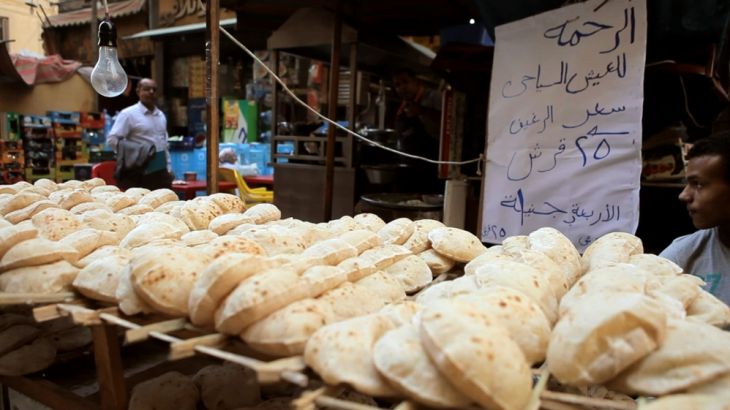
Egypt: On the breadline
Once the provider of grain to the entire Roman Empire, Egypt is now the largest importer of wheat in the world.
Filmmaker: Moutaz Kandil
“Bread, freedom and social justice” was one of the slogans chanted by thousands on the streets of Cairo in 2011, part of the revolution that triggered the downfall of President Hosni Mubarak. Bread is a matter of life and death in Egypt. It’s a recognised staple in the diets of most Egyptians and its demand and supply has major social and political implications.
Keep reading
list of 4 items‘Mama we’re dying’: Only able to hear her kids in Gaza in their final days
Europe pledges to boost aid to Sudan on unwelcome war anniversary
Birth, death, escape: Three women’s struggle through Sudan’s war
The Nasser, Sadat and Mubarak governments all grappled with decreasing production and increased demand – and the Sisi government has pledged to end corruption as a whole, including in the wheat industry. So, in 2014, it introduced a smart card-based subsidy programme aimed at helping those most in need.
For poor people, bread is a lifeline. How will they survive without it?
The government claims that the new programme has helped to save three-quarters of a million dollars a year. Critics say it has simply increased fraud by enabling bakers to falsify receipts and request far more subsidised flour than they actually sell, costing the country millions of dollars a year.
The Egyptian dialect for bread is “aish”, meaning “life”, and until the country is able to resolve its wheat problem by becoming more self-sufficient, it’s likely to remain at the mercy of the international grain markets and poorer people in Egyptian society will continue to struggle on the breadline.
Awad Mansour is an Egyptian farmer. He looks back fondly at the days when wheat growing and harvesting was much simpler than it is now with new government interventions.
“My father was a wheat farmer because it was the crop we relied on to make bread. We used to harvest the wheat, send it to bakeries and produce flour. My mother baked it and we ate bread all year. We kept what we needed and sold the rest.”
Ahmed Gebreel, also a farmer, explains how things have changed for those who continue to choose to grow wheat.
“When we plant the wheat in large quantities, we sell it to the government which sets a very low price that doesn’t cover our costs. That’s why farmers are now producing wheat only to cover their family needs because they can barely make ends meet.”
How did Egypt let this demand-and-supply equation get out of control and when did its troubles begin? Some argue that this is a decades-long issue, while others say it has to do with more recent corruption.
“Until President Nasser’s rule in the 1970s, we had no problem in this area,” says Ismail Abo Zid, former Middle East food coordinator with the United Nations’ Food and Agriculture Organization.
“We had an agricultural cycle system in which farmers were obliged to produce a certain quantity of wheat based on a general production map. One area produced wheat, another cotton, a third alfalfa and so on. Agricultural production was effectively rationed.”
Dr Nader Fergany, a political scientist at Zagazig University in Egypt, considers firmly that it was the Mubarak regime that undermined wheat farmers’ rights.
“The Mubarak government was the worst ever because they started allowing those close to the establishment to monopolise key markets. The wheat market, especially imports, was not safe from monopoly. Monopoly aims at flagrantly benefiting monopolists. The Egyptian people were put at the mercy of global markets, local market fluctuations and the monopolists’ efforts to increase their profits.”
With Egypt entering into foreign policy agreements which arguably favour other countries but not ordinary Egyptians, plus new laws subsidising wheat production and its sale, how is Egypt’s wheat problem likely to play out for those most affected by it?
“The problem is, unfortunately, not going away over time. It is expected to be even harder in the future if no measures are taken to increase our food self-sufficiency, especially in wheat production,” Fergany says.